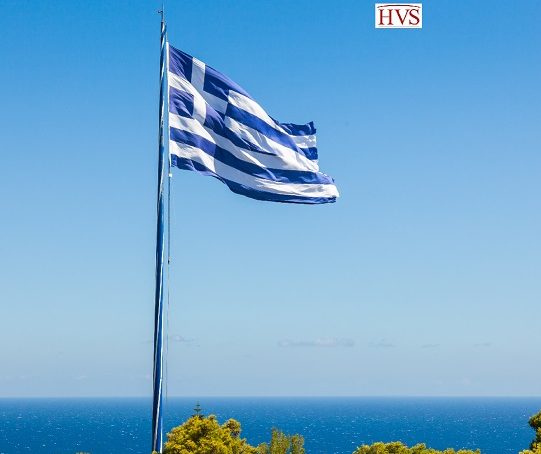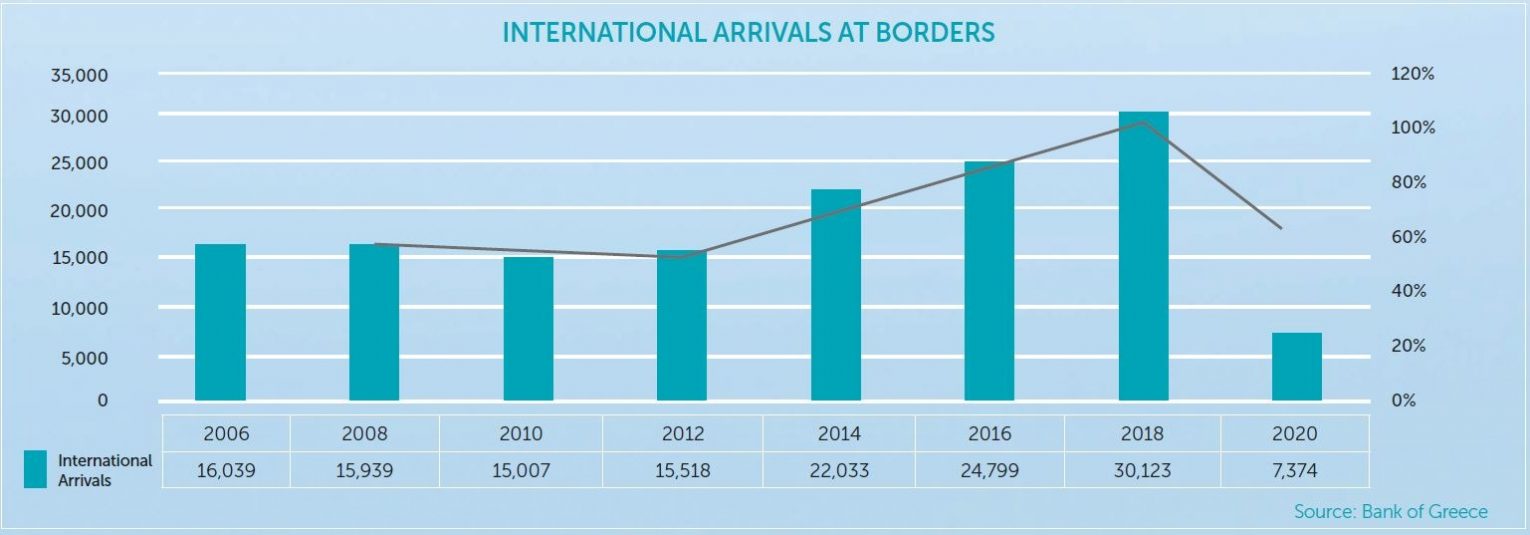

With Germany, the UK, France, Italy, Russia and the U.S. constituting its most dominant source markets, Greece has seen little, if any, change to its “customer stock source” over the past decade. Visitation from these countries has supported the Greek hospitality market during the recession through to its record year in 2019, just before Covid-19.
If we were to draw certain conclusions on how the Greek tourism industry has evolved during periods of both austerity and welfare, we would conclude that:
• Hotel ownership has remained primarily domestic
• International visitation is highly controlled by mass tourism operators, especially on the islands
• The tourism product faces intense seasonality
• The Greek tourism industry is confined to its sea and sun product.
With Greece emerging as one of the most sought-after holiday destinations, a review of the market’s evolution over the last years can unlock significant insight into its future outlook. It’s possible to challenge some of these constants and shed light on recent developments that are expected to change how the Greek hospitality industry is perceived.
Demand
Emergency bailout funds and grueling austerity affected the country’s tourism industry due to repeated images of riots and strikes against the measures, capital controls and the rumors regarding Greece’s bankruptcy. The resulting socio-political and economic instability caused turbulences to tourist arrivals during 2009 and 2013. Nevertheless, because tourism has been strongly controlled by tour operators in the mass tourism sector, Greece’s hospitality industry remained relatively resilient, achieving slow yet positive growth. In 2014, international arrivals climbed a record 23 percent from a year earlier, and confidence in the Greek economy was slowly restored. After nine years of volatile conditions, 2018 constituted a feat for Greece, with tourist numbers increasing by around 2 million annually from 2016 to 2018; hotels were full to the brim. This growth continued in 2019, which saw a year-on-year increase of 4.1 percent to reach 31.4 million inbound travelers. Greece was seen as one of the strongest European countries in terms of travel and tourism, reporting a revenue record of EUR 18.1 billion in 2019. While forecasts were predicting the 2020 season to take off, Covid-19 left the industry with a 76.5 percent decrease in inbound visitors and a 78.1 percent plunge in hotel revenues. Yet the rapid response of the country through safety measures, the acceleration of vaccinations and the lifting of travel restrictions enabled the industry to achieve an almost V-shaped rebound in 2021. Efforts to establish Greece as a safe destination paid off with tourism revenues surpassing EUR 10 billion, reaching approximately 60 percent of the 2019 levels in terms of visitation.
Hotel market supply
However, hotel supply did not follow the same pace as increased visitation, at least for the period 2005 to 2015. Up until the early signs of economic recovery in 2014, the sector was still capitalizing on existing hotel stock, with only a few branded hotels entering the market. In 2013, branded properties accounted for 513 hotels, equating to just 5 percent of supply. The lack of a reliable classification system until its introduction in 2015, the seasonality pattern and the domination of family-run businesses created high barriers of entry for international operators, limiting the share of branded hotels in Greece to levels lower than in other countries. Gradually, the number of properties that made their debut in the branded hotel landscape increased by 65 percent in 2021 compared to 2016, achieving a penetration rate of 10 percent in that year compared to 6 percent in 2016. This growth is mainly supported by international brands, including Marriott, Brown Hotels, Hilton, Four Seasons and Accor. The hotel stock shifted upscale over time, and given the increased presence of brands, a greater number of luxury hotels launched operations from 2018 onwards, representing 23 percent of supply in 2020. The five-star segment reported a percentage change of 401 percent in room supply growth since 2000, highlighting the effort to develop upscale properties that could accommodate more affluent individuals. Today, about 83 percent of the hotel rooms in the five-star segment are branded.
Investment activity
Significant hotel investments are poised to take place in the country’s tourism industry in the coming years, dovetailing with important infrastructure improvements. With current activity described as “investment fever,” new hotels are constantly being built with an eye on the post-pandemic era. While activity is already evident in popular destinations, it can also be found on other fronts, since lesser-known corners of Greece are seen as upcoming tourism spots. Some of the developments that are making an entrance include brands such as W, One&Only, Nobu, Mandarin Oriental and others. With high aspirations for the future, it is believed that these high-profile investments are just the vanguard of a development explosion, ultimately leading to a shift in the ownership structure of Greek hotel properties, from family-run enterprises to local or international real estate investment companies (REICs).
2022 and beyond
Bracing itself for a strong tourism season, Greece is expected to see swift recovery. With travelers eager to put the pandemic behind them, a travel surge is anticipated, resulting in an earlier start to the season for certain destinations. While the industry is moving full steam ahead, product diversification is necessary to enable Greek tourism to emerge stronger and improve its share of tourist activity and demand worldwide. The national strategy intends to touch upon three pillars for thematic tourism:
• Transformative and wellness tourism
• Sustainable and eco-tourism
• Alternative tourism
The aim of the plan is to adopt some of the latest travel trends evolving around wellness, to develop a sustainable tourism model and to promote lesser-known destinations. Ultimately, the strategy will lead to the extension of the tourism season by introducing a more diverse o°ering than one focused largely on the sea and sun, increasing the average length of stay and tourist spending, and providing new opportunities for attractive investments. Key to the plan’s success is the urgent operation of destination marketing organizations (DMOs) under the recently introduced legal framework. DMOs will aim to reinforce synergies between stakeholders and address the development needs of each destination toward Greece’s aim for a strengthened, invigorated product.
Greek magic
Greece’s tourism market remains vibrant and is expected to grow further. By pushing the pause button, the pandemic created the need to reimagine the country’s tourism product and to review some of the dated concepts that no longer support Greece’s tourism vision. Recent and future developments are poised to alter Greece’s tourism model, diversifying its o°ering, engaging foreign investment entities for an upgraded infrastructure and flattening the seasonality curve.



Pavlos Papadimitriou
HVS Athens’ director

Gelina Kordoni
HVS analysist
















